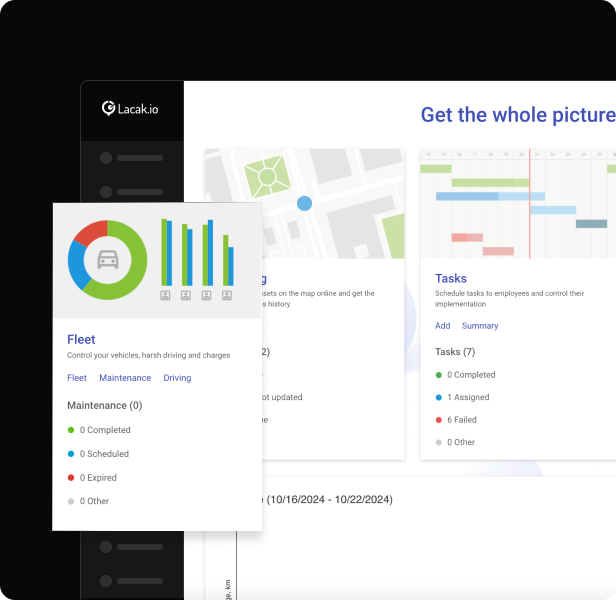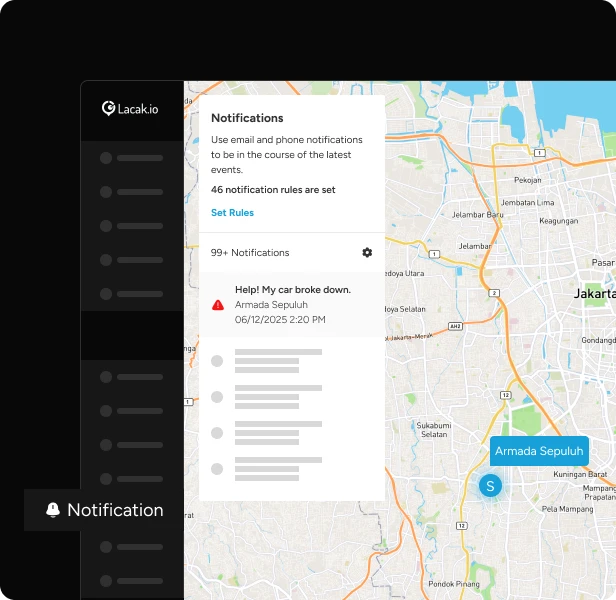Imagine having dozens or even hundreds of operational vehicles for your business—from delivery trucks, sales team vehicles, to heavy equipment in mining. Can you monitor all of them in real-time? What if there are vehicles used outside of working hours? Or, worse, a fleet that is wasteful of fuel and unscheduled maintenance?
Without an integrated system, a vehicle fleet can be a source of hidden costs in your business operations. This is where the Fleet Management System (FMS) comes in as a solution to manage vehicles more efficiently, reduce waste, and increase productivity.
What exactly is a Fleet Management System? How does it benefit your business? And how to implement it effectively? Let’s explore it in depth.
What is a Fleet Management System?
A Fleet Management System (FMS) is a technology-based system that helps businesses track, manage, and optimize the use of their vehicle fleet. With the support of the Internet of Things (IoT) and Artificial Intelligence (AI), FMS provides real-time data on:
- Vehicle location: Ensures that each unit can be monitored at any time.
- Fuel consumption: Identify fuel-guzzling vehicles and help control costs.
- Driver behavior: Monitor actions such as hard braking or excessive acceleration to improve safety.
- Maintenance scheduling: Arrange routine servicing to keep vehicles in optimal condition.
Think of FMS as an intelligent system that not only tracks vehicle locations but also provides deep insights to ensure your fleet is being used to its full potential.
Benefits of Fleet Management System for Your Business
Using Fleet Management System is more than just monitoring vehicles. Here are some of its key benefits:
1. Improved Operational Efficiency
With real-time monitoring, businesses can ensure that vehicles are being used according to operational schedules and avoid misuse outside of working hours. This helps minimize unnecessary usage and optimize fleet performance.
2. Operational Cost Savings
FMS helps identify fuel-guzzling vehicles and prevent late servicing. With the right information, you can reduce fuel costs and avoid costly emergency maintenance. Some companies report fuel cost savings of up to 15-25% per year after implementing this system.
3. Improve Fleet and Driver Safety
By analyzing driving behavior, such as sudden braking and excessive acceleration, FMS can reveal risky patterns. This data allows companies to provide proper training to drivers, thereby reducing the potential for accidents and improving fleet safety.
4. More Scheduled Vehicle Maintenance
FMS provides notifications based on mileage or usage time, ensuring that each vehicle is serviced at the right time. This minimizes the risk of sudden breakdowns and extends the life of the vehicle.
5. Easier Regulatory Compliance
For companies in the transportation or logistics sector, complying with regulations is a must. FMS helps store and manage important documents such as STNK, KIR, and operational permits so that they are always up-to-date.
Tips for Using Fleet Management System Effectively
Having FMS is not enough. Here are some tips to optimize its use:
-
Choose a System that Suits Business Needs.
Make sure the system you choose has features that are relevant to the scale of your fleet, such as real-time tracking and fuel consumption analysis.
-
Use Data for Decision Making
Don’t just look at the numbers on the dashboard—use the data to identify areas for improvement, such as vehicles that are wasteful of fuel and need evaluation.
-
Train Drivers and Operations Teams
Make sure all parties understand how to use this system to support more efficient and safe operations.
-
Perform Regular System Maintenance
Like vehicles, FMS systems also need to be updated and calibrated so that the data produced remains accurate and relevant.
Examples of Fleet Management System Applications in Various Industries
Fleet Management Systems can be implemented in various business sectors, including:
-
Logistics and Distribution
Expedition and shipping companies use FMS to monitor vehicle usage, reduce usage outside of working hours, and control operational costs.
-
Public Transportation
Bus operators and online taxi services use this system to improve their fleet monitoring.
-
Mining and Construction
FMS helps manage heavy equipment and ensures vehicles are only used within designated operational areas, minimizing the risk of accidents.
-
Car Rental Companies
This system ensures vehicles are not used beyond the rental hours and helps detect violations committed by renters.
Fleet Management System: A Profitable Investment
A Fleet Management System is more than just a vehicle tracking tool; it is a smart solution to improve operational efficiency, save costs, and maintain fleet security. If you are still relying on manual methods to manage your vehicles, it is time to switch to a more modern, data-driven solution.
Optimize Your Business Fleet with Lacak.io
Join hundreds of companies that have felt the benefits of the Indonesian Fleet Management System from Lacak.io. With advanced features such as:
Monitor Entire Fleet Activity
Through IoT (Internet of Things) technology, our solution is able to record various fleet activities directly and accurately such as location, travel history, engine working hours, distance traveled, and vehicle entry and exit. Digitalization will help you to manage your fleet better and more efficiently.
All Data In One Dashboard
All the solutions we provide have been strengthened with a universal dashboard, so that all data regarding the fleet can be managed more orderly. This dashboard is also very easy to use thanks to the presentation of data that can be customized in the form of visualization.
Integration of Other IoT Devices
Live Fleet Tracker can also be combined with various other IoT devices that can support performance in the field. With various other functions, your fleet can provide more complete data such as temperature on the load, weight of the load, fuel consumption, and others.







